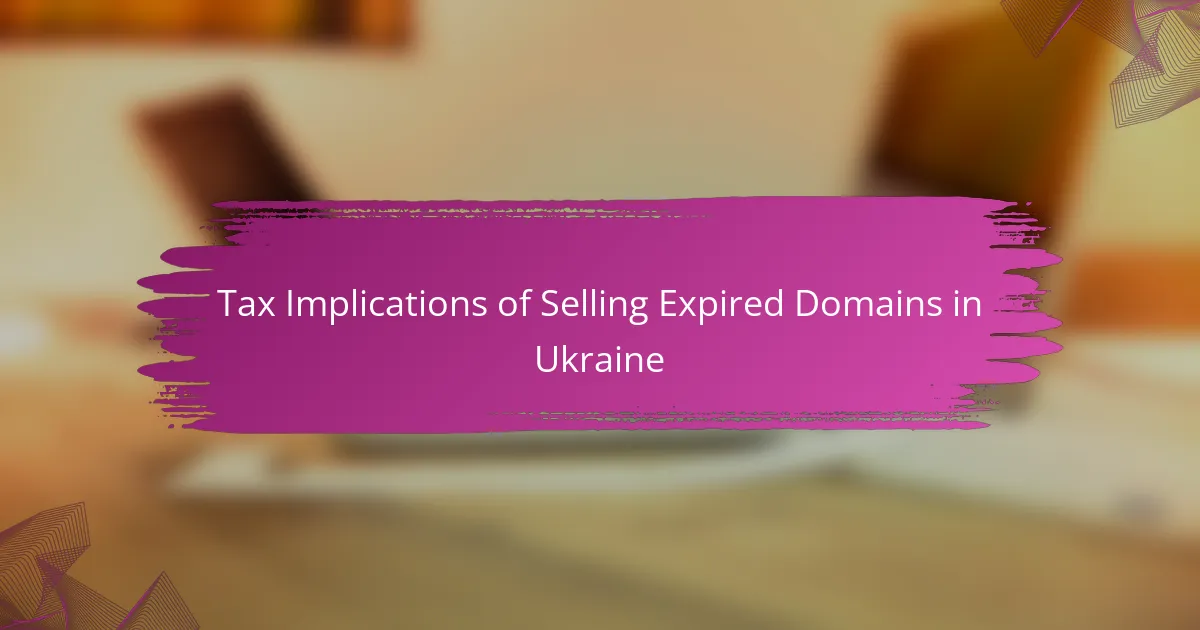Selling expired domains in Ukraine involves navigating various tax implications, such as capital gains tax, value-added tax, and income tax obligations. It is essential for sellers to accurately report profits from these sales as part of their overall taxable income to ensure compliance with local tax laws.
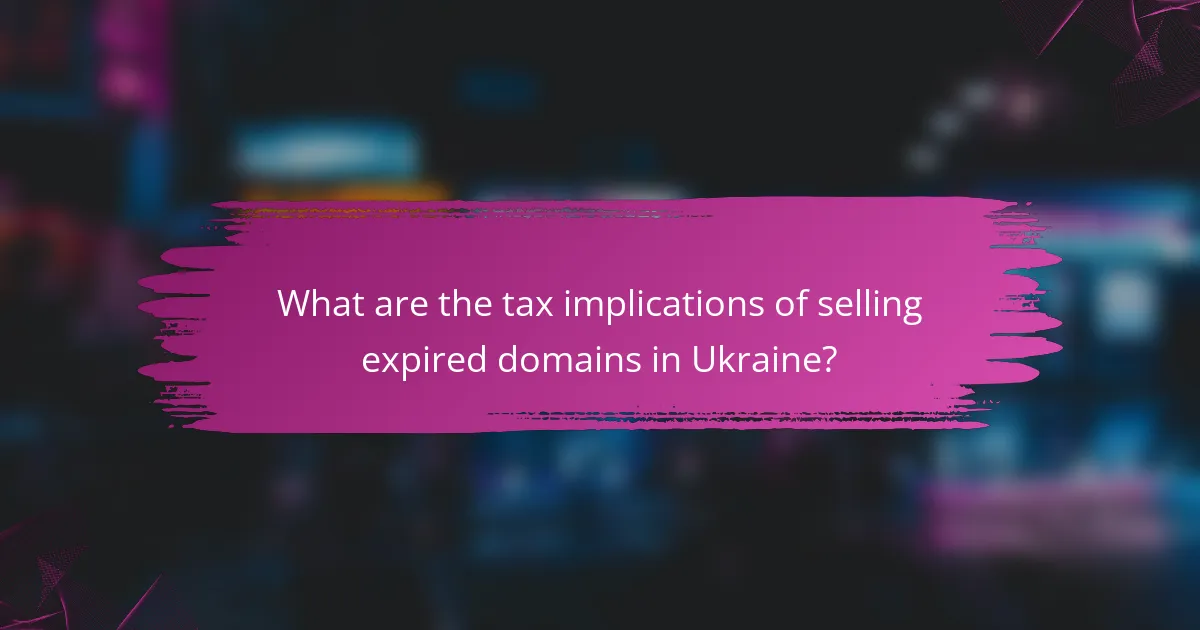
What are the tax implications of selling expired domains in Ukraine?
Selling expired domains in Ukraine can have various tax implications, including capital gains tax, value-added tax, and income tax obligations. Understanding these taxes is crucial for compliance and effective financial planning.
Capital gains tax on domain sales
When you sell an expired domain for a profit, the earnings may be subject to capital gains tax. In Ukraine, the capital gains tax rate is typically around 18% on the profit made from the sale. If you sell the domain for less than you purchased it, you will not incur a capital gains tax liability.
To calculate your capital gains, subtract the original purchase price from the selling price. For example, if you bought a domain for 1,000 UAH and sold it for 3,000 UAH, your taxable gain would be 2,000 UAH.
Value-added tax considerations
Value-added tax (VAT) may apply to the sale of expired domains if you are registered as a VAT payer in Ukraine. The standard VAT rate is 20%, and it is applicable to the sale of goods and services. If the expired domain sale is considered a business activity, you must charge VAT on the sale price.
For instance, if you sell a domain for 5,000 UAH and are required to charge VAT, the total amount payable by the buyer would be 6,000 UAH (5,000 UAH + 20% VAT).
Income tax obligations
In addition to capital gains tax, income from selling expired domains may also be subject to personal income tax in Ukraine. The income tax rate is generally around 18% on your total income, including profits from domain sales. If you are operating as a business, different tax regulations may apply.
Keep detailed records of your domain sales and associated costs to accurately report your income. This will help ensure compliance with tax regulations and allow you to take advantage of any allowable deductions.

How to report income from expired domain sales in Ukraine?
In Ukraine, income from selling expired domains must be reported as part of your overall taxable income. This includes any profits made from the sale, which should be documented accurately for tax purposes.
Filing requirements for individuals
Individuals selling expired domains must report their income on their annual tax return. This income is typically classified under other income sources and should be included in the total income calculation. It’s essential to maintain records of sales, including dates and amounts, to substantiate your claims during tax assessments.
For individuals, the tax rate on this income can vary based on total earnings, so it’s advisable to consult with a tax professional to ensure compliance with local regulations. Failure to report this income may lead to penalties or additional taxes owed.
Business registration implications
If you regularly buy and sell expired domains, you may need to register as a business in Ukraine. This registration can affect how you report income and the applicable tax rates. Being classified as a business may also allow you to deduct certain expenses related to domain acquisition and sales.
Additionally, businesses must adhere to more stringent accounting practices and may be subject to value-added tax (VAT) on sales. It’s crucial to evaluate whether your domain sales activity qualifies as a business to ensure proper tax treatment and compliance with Ukrainian laws.
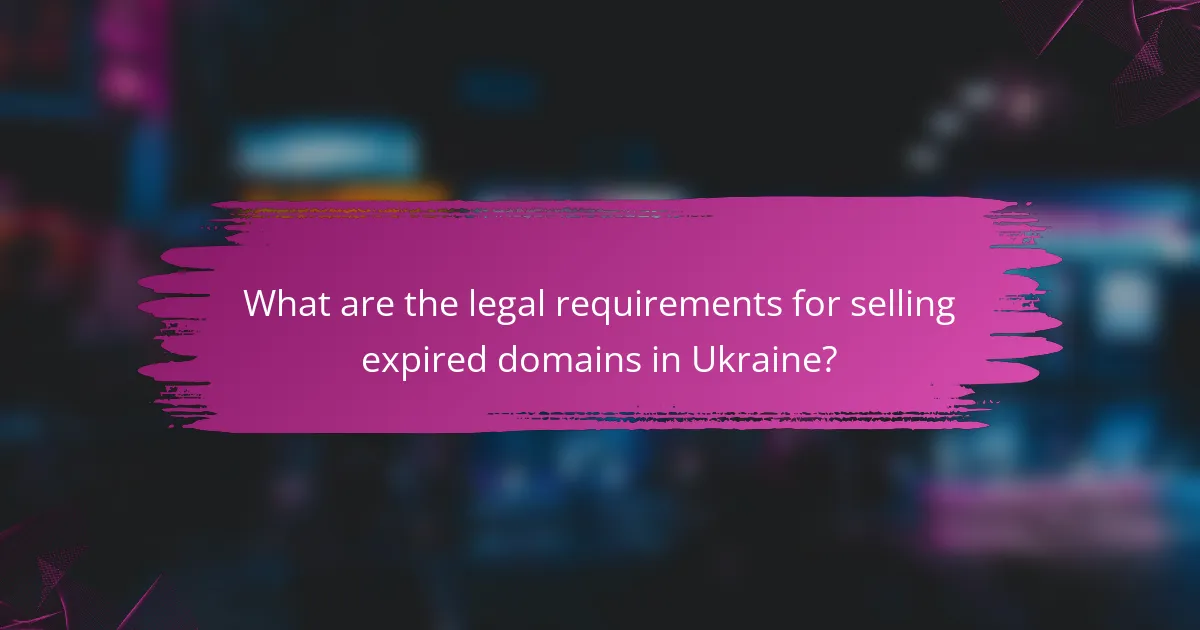
What are the legal requirements for selling expired domains in Ukraine?
To sell expired domains in Ukraine, you must ensure you have legal ownership of the domain and comply with local e-commerce regulations. This includes verifying domain ownership and adhering to consumer protection laws applicable to online transactions.
Domain ownership verification
Before selling an expired domain, you need to confirm that you are the rightful owner. This typically involves checking the domain’s registration details through a WHOIS lookup. If the domain has recently expired, ensure that you have the necessary rights to sell it, as some registrars may have specific policies regarding expired domains.
Additionally, if you acquired the domain through a transfer or purchase, keep documentation of the transaction to prove ownership. This can help prevent disputes with potential buyers.
Compliance with Ukrainian e-commerce laws
Selling expired domains in Ukraine requires compliance with e-commerce laws, which include consumer rights and data protection regulations. Ensure that your sales process is transparent, providing clear information about the domain and any associated terms.
It is advisable to include a return policy and terms of service on your sales platform. Being clear about these aspects can help build trust with buyers and reduce the risk of legal issues. Familiarize yourself with the Law of Ukraine on E-commerce to ensure full compliance.
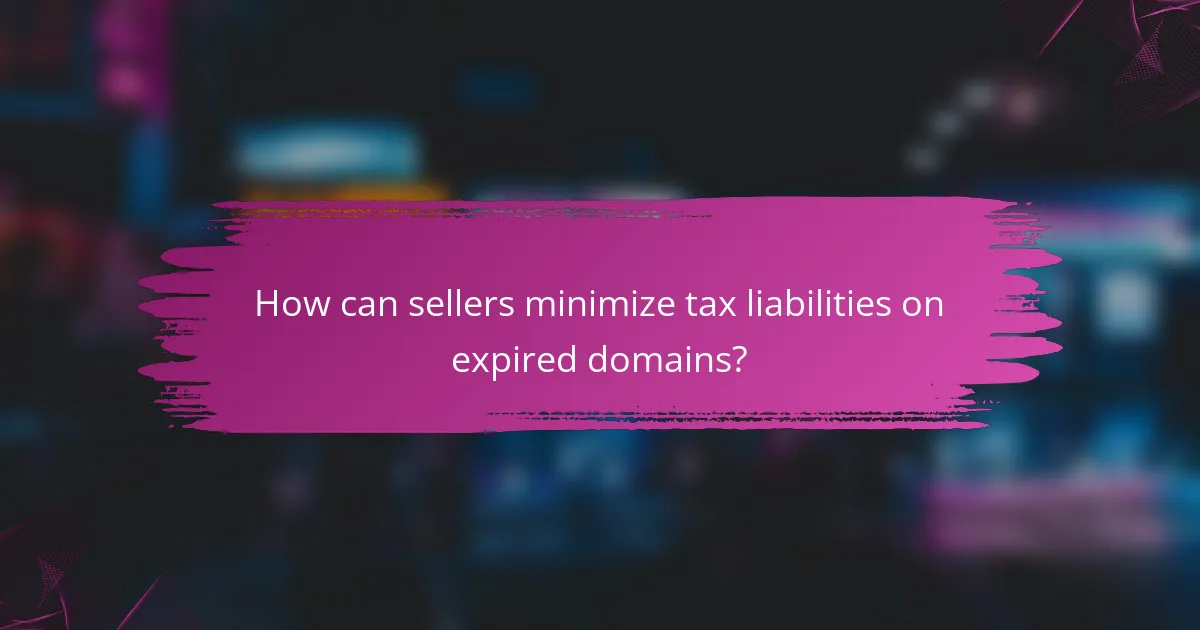
How can sellers minimize tax liabilities on expired domains?
Sellers can minimize tax liabilities on expired domains by carefully tracking expenses related to the sale and leveraging tax treaties. Understanding the local tax regulations and utilizing available deductions can significantly reduce taxable income.
Tax deductions for business expenses
In Ukraine, sellers can deduct legitimate business expenses from their taxable income when selling expired domains. This includes costs such as domain registration fees, hosting services, and marketing expenses. Keeping detailed records of these expenditures is essential for claiming deductions.
For example, if a seller incurs costs of around 1,000 UAH for domain registration and 500 UAH for advertising, they can deduct these amounts from their total income, effectively lowering their tax burden. It is advisable to consult with a tax professional to ensure all eligible expenses are claimed correctly.
Utilizing tax treaties
Ukraine has entered into various tax treaties with other countries to prevent double taxation on income. Sellers of expired domains who are non-residents may benefit from reduced withholding tax rates on their earnings. Understanding the specific provisions of these treaties can help sellers retain more of their profits.
For instance, if a seller based in Ukraine sells a domain to a buyer in a country with a favorable tax treaty, they may only face a reduced tax rate instead of the standard rate. Sellers should review the applicable treaties and consider seeking advice from a tax expert to navigate these complexities effectively.
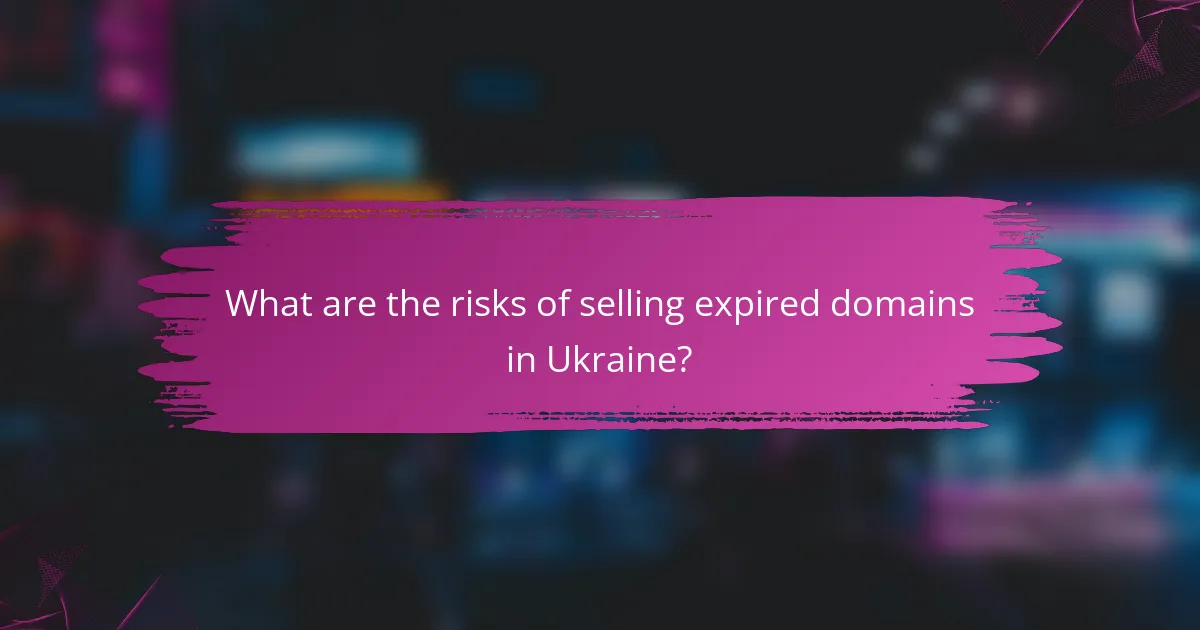
What are the risks of selling expired domains in Ukraine?
Selling expired domains in Ukraine carries several risks, including potential legal disputes and tax audits. Understanding these risks is crucial for anyone looking to engage in this market to avoid costly mistakes and ensure compliance with local regulations.
Potential legal disputes
Legal disputes can arise from the sale of expired domains if the original owner claims ownership or if the domain infringes on trademarks. Buyers should conduct thorough due diligence to verify that the domain is free from any legal encumbrances before completing the transaction.
Additionally, it is advisable to keep records of the purchase and any communications related to the domain. This documentation can serve as evidence in case of future disputes, protecting both the seller and buyer.
Tax audits and penalties
In Ukraine, selling expired domains may trigger tax obligations, and failure to report income can lead to audits and penalties. Sellers should be aware of the current tax regulations regarding income from domain sales and ensure they report any earnings accurately.
To minimize the risk of audits, maintain clear financial records and consult with a tax professional familiar with digital asset transactions. This proactive approach can help avoid unexpected tax liabilities and ensure compliance with Ukrainian tax laws.
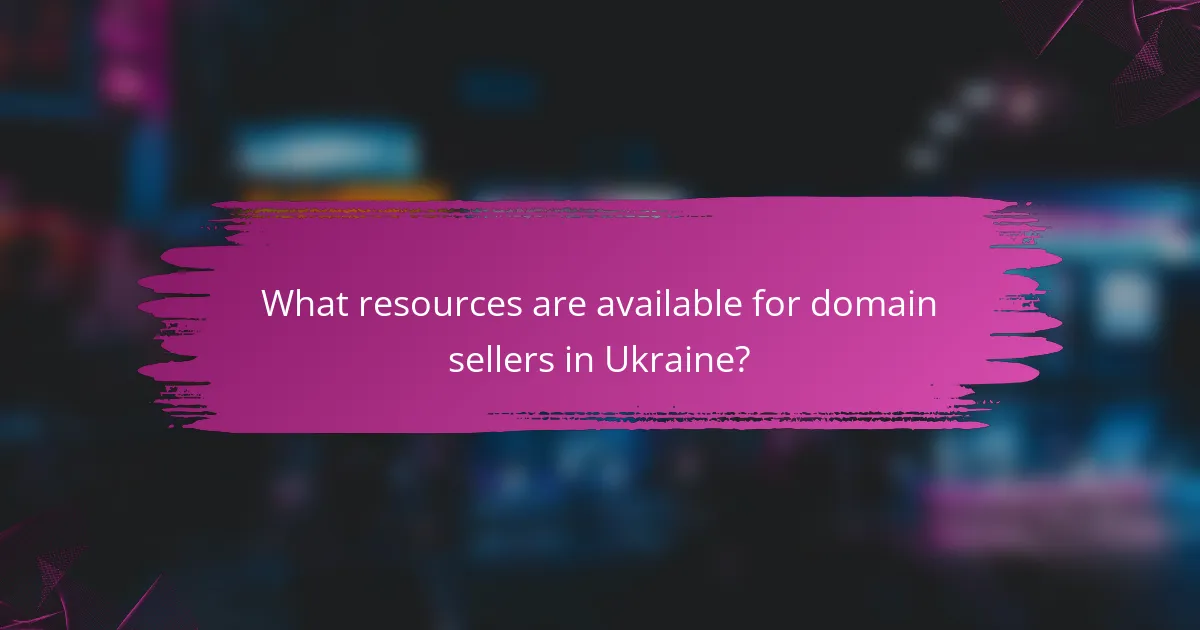
What resources are available for domain sellers in Ukraine?
Domain sellers in Ukraine can access various resources to navigate the complexities of selling expired domains. These resources include local tax advisory services and online marketplaces that facilitate domain transactions.
Local tax advisory services
Utilizing local tax advisory services is crucial for domain sellers in Ukraine to understand their tax obligations. These professionals can provide insights into applicable taxes, such as income tax on profits from domain sales, which can range from 18% to 20% depending on the seller’s status.
When selecting a tax advisor, consider their experience with digital assets and domain transactions. A knowledgeable advisor can help you structure your sales to minimize tax liabilities and ensure compliance with local regulations.
Online domain marketplaces
Online domain marketplaces are platforms where sellers can list their expired domains for potential buyers. Popular options include platforms like GoDaddy, Sedo, and Namecheap, which cater to a global audience, including Ukrainian buyers.
When using these marketplaces, be aware of listing fees and commission structures, which can vary significantly. It’s advisable to compare several platforms to find the best fit for your domains, considering factors like user traffic and sales support services.

What trends are emerging in the expired domain market in Ukraine?
The expired domain market in Ukraine is witnessing a surge in interest as more individuals and businesses recognize the potential value of digital assets. This trend is driven by the increasing digitization of businesses and the need for online presence, making expired domains an attractive investment opportunity.
Increased interest in digital assets
As the digital landscape evolves, many entrepreneurs in Ukraine are turning to expired domains as a means to establish or enhance their online presence. These domains often come with existing traffic and backlinks, which can provide a head start in search engine rankings.
Investors are particularly drawn to domains that have a history of good performance or are relevant to specific niches. The potential for generating revenue through advertising or resale adds to their appeal. However, buyers should conduct thorough research to ensure the domain’s past aligns with their business goals.
